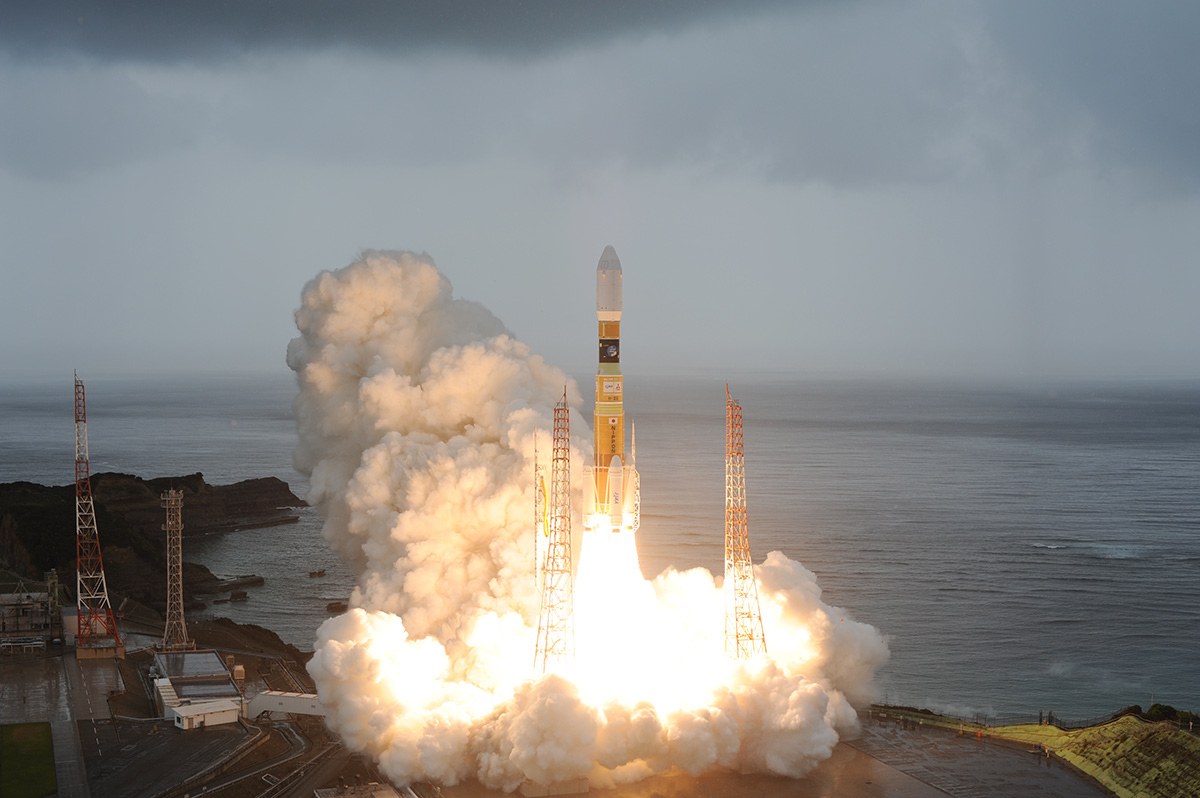
H-IIB
In-activeMitsubishi Heavy Industries (MHI)
Sept. 10, 2009
Description
H-IIB (H2B) is an expendable launch system used to launch H-II Transfer Vehicles (HTV, or Kounotori) towards the International Space Station. H-IIB rockets are liquid-fuelled with solid-fuel strap-on boosters and are launched from the Tanegashima Space Center in Japan. Mitsubishi and JAXA have been primarily responsible for design, manufacture, and operation of H-IIB.
Specifications
-
Max Stage
2 -
Length
56.6 m -
Diameter
5.2 m -
Fairing Diameter
― -
Launch Mass
551.0 T -
Thrust
9000.0 kN
Family
-
Name
H-IIB -
Family
― -
Variant
304 -
Alias
― -
Full Name
H-IIB 304
Payload Capacity
-
Launch Cost
$112500000 -
Low Earth Orbit
16500.0 kg -
Geostationary Transfer
Orbit
8000.0 kg -
Direct Geostationary
― -
Sun-Synchronous Capacity
―
Mitsubishi Heavy Industries
Commercial
President: Seiji Izumisawa
MHI 1884Mitsubishi Heavy Industries, Ltd. is a Japanese multinational engineering, electrical equipment and electronics company headquartered in Tokyo, Japan. MHI is one of the core companies of the Mitsubishi Group. MHI's products include aerospace components, air conditioners, aircraft, automotive components, forklift trucks, hydraulic equipment, machine tools, missiles, power generation equipment, printing machines, ships and space launch vehicles. Through its defense-related activities, it is the world's 23rd-largest defense contractor measured by 2011 defense revenues and the largest based in Japan.
H-IIB 304 | Kounotori 9 (HTV-9)
Mitsubishi Heavy Industries | JapanTanegashima Space Center, Japan
May 20, 2020, 5:31 p.m.
Status: Launch Successful
Mission:
The last H-II Transfer Vehicle "Kounotori" will be launched on an H-IIB 304 launch vehicle, carrying 6,200 kg (13,669 lbs) of supplies and science experiments to be conducted by astronauts aboard the International Space Station. Kounotori 9 will be the last original HTV spacecaft : its successor scheduled to launch in February 2022 will be the first of the new HTV-X version.
Low Earth OrbitH-IIB 304 | Kounotori 8 (HTV-8)
Mitsubishi Heavy Industries | JapanTanegashima Space Center, Japan
Sept. 24, 2019, 4:05 p.m.
H-IIB 304 | Kounotori 7 (HTV-7)
Mitsubishi Heavy Industries | JapanTanegashima Space Center, Japan
Sept. 22, 2018, 5:52 p.m.
H-IIB 304 | Kounotori 6 (HTV-6)
Mitsubishi Heavy Industries | JapanTanegashima Space Center, Japan
Dec. 9, 2016, 1:26 p.m.
Status: Launch Successful
Mission:
This is the sixth flight of an uncrewed cargo spacecraft to International Space Station. It will bring the replacement for the batteries used on the Station to store electricity generated by solar panels, as well as 600 liters of potable water.
Low Earth OrbitH-IIB 304 | Kounotori 5 (HTV-5)
Mitsubishi Heavy Industries | JapanTanegashima Space Center, Japan
Aug. 19, 2015, 11:50 a.m.
H-IIB 304 | Kounotori 4 (HTV-4)
Mitsubishi Heavy Industries | JapanTanegashima Space Center, Japan
Aug. 3, 2013, 7:48 p.m.
H-IIB 304 | Kounotori 3 (HTV-3)
Mitsubishi Heavy Industries | JapanTanegashima Space Center, Japan
July 21, 2012, 2:06 a.m.
H-IIB 304 | Kounotori 2 (HTV-2)
Mitsubishi Heavy Industries | JapanTanegashima Space Center, Japan
Jan. 22, 2011, 5:37 a.m.
Falcon 9
Starlink Group 17-26
Space Launch Complex 4E - Vandenberg SFB, CA, USAA batch of 25 satellites for the Starlink mega-constellation - SpaceX's project for space-based Internet communication system.
Falcon 9
Starlink Group 6-110
Space Launch Complex 40 - Cape Canaveral SFS, FL, USAA batch of 29 satellites for the Starlink mega-constellation - SpaceX's project for space-based Internet communication system.
Falcon 9
Starlink Group 6-104
Space Launch Complex 40 - Cape Canaveral SFS, FL, USAA batch of 28 satellites for the Starlink mega-constellation - SpaceX's project for space-based Internet communication system.
Falcon 9
Starlink Group 17-25
Space Launch Complex 4E - Vandenberg SFB, CA, USAA batch of 25 satellites for the Starlink mega-constellation - SpaceX's project for space-based Internet communication system.
Falcon 9
Starlink Group 10-36
Space Launch Complex 40 - Cape Canaveral SFS, FL, USAA batch of 29 satellites for the Starlink mega-constellation - SpaceX's project for space-based Internet communication system. First Starlink laun…

